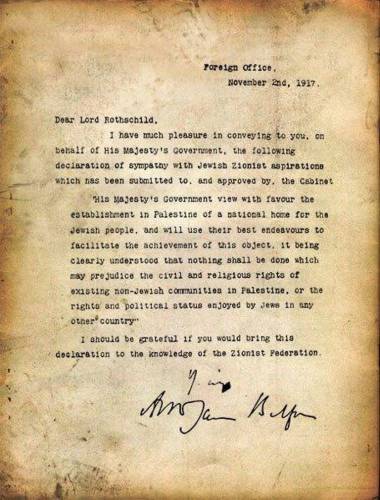Balfour Declaration At 100: Some Pertinent Reflections

We prayed to end the Sultan’s curse, the British came and spoke a verse.
“It’s World War One, if you agree- to fight with us we’ll set you free.”
The war we fought at Britain’s side,-our blood was shed for Arab pride.
At war’s end Turks were smitten,-our only gain, the lies of Britain.
This Stephen Ostrander’s simple verse manages to cut through a mountain of rhetoric to the root cause of the Arab-Israeli conflict. The question of giving Palestinians their own homeland has commanded the attention of the UN since the organization was founded. Since resolutions 242 and 338, the Security Council has taken no significant steps to end the Israel-Palestine conflict, in the light of continued Israeli arrogance and US hegemony. As we reflect on origins of this conflict, we cannot overlook “the single most destructive political document of the 20th century on the Middle East” (as the leading Palestinian historian Walid Khalidi described it), – the Balfour Declaration, the centenary of which falls in November this year.
Incidentally, Britain sponsored the Zionist project through the Balfour Declaration to transform Arab Palestine into a ‘Jewish state’ in November 1917. The Declaration was actually a letter written on November 2, 1917, by the then foreign secretary of Britain, Arthur James Balfour, to Baron Walter Rothschild, a leader of the British Jewish community, for transmission to the Zionist Federation of Great Britain and Ireland. Although it did not offer partition, it sowed the seeds for it, which eventually allowed the Zionist movement to occupy Palestine.
The letter promised the Jews a “national home” in Palestine, which was then a part of the Ottoman Empire but was soon to be ruled under a British mandate, without prejudicing the “civil and religious rights of existing non-Jewish communities in Palestine”. It was later incorporated into a peace treaty with the Ottoman Empire and the British Mandate for Palestine, despite contradicting other agreements. This Declaration was a prime example of colonial arrogance shown by Britain; which Arthur Koestler witheringly summarised as a document in which ‘one nation solemnly promised to a second nation the country of a third’. No wonder Palestinians casted aside the Mandate as the illegitimate exercise of British imperialism. It is worth our while to re-read Edward Said’s wise words about the Balfour Declaration.
“What is important about the Declaration is, first, that it has long formed the juridical basis of Zionist claims to Palestine, and second, more crucial for our purposes here, that it was a statement whose positional force can only be appreciated when the demographic, or human realities of Palestine are clearly understood. For the Declaration was made (a) by a European power (b) about a non-European territory (c) in a flat disregard of both the presences and the wishes of the native majority resident in that territory, and (d) it took the form of a promise about this same territory to another foreign group, that this foreign group might, quite literally, make this territory a national home for the Jewish people.”.In fact, it was more than that: It allowed a settler colonial movement, appearing very late in history, to envisage a triumphant project even before it set proper foot in the land or had a meaningful geographical and demographic presence there”.

